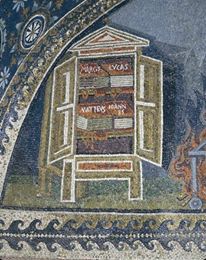11 August OS 2020: Tuesday of the Twelfth Week of St. Matthew; Afterfeast of the Transfiguration; Holy Deacon Martyr Euplos
Today’s reading from the Gospel is Mark 1: 9-15.
And it came to pass in those days, that Jesus came from Nazareth of Galilee, and was baptized of John in Jordan. And straightway coming up out of the water, he saw the heavens opened, and the Spirit like a dove descending upon him: And there came a voice from heaven, saying, Thou art my beloved Son, in whom I am well pleased. And immediately the Spirit driveth him into the wilderness. And he was there in the wilderness forty days, tempted of Satan; and was with the wild beasts; and the angels ministered unto him. Now after that John was put in prison, Jesus came into Galilee, preaching the gospel of the kingdom of God, And saying, The time is fulfilled, and the kingdom of God is at hand: repent ye, and believe the gospel.
Today we begin reading from the Gospel According to St. Mark, the shortest and most direct of the four Gospels. (It is still the season of St. Matthew, because we are still reading from St. Matthew on Saturdays and Sundays, but during the week we have begun reading St. Mark.)
St. Mark, the disciple of St. Peter, wrote his Gospel for the Church at Rome, and the terse and concise character of this Gospel corresponds to the old Roman character: simple, direct, and to the point. Today, St. Mark briefly recounts the Lord’s baptism and temptation in the wilderness, and tells of the beginning of Christ’s preaching. All in seven verses!
St. Mark’s brevity brings into relief a fact about all the Gospels. They are not biographies of Jesus Christ; they simply proclaim Who He is. They contain only what we need to know, to believe, and to do in order to find salvation. We must read and hear these words (literally, physically read and hear them), make an act of faith in their truth, pray for understanding, resolve to live according to their demands, and repent for failing to do so. This must happen day after day, or we forget what a Christian is.
If we have been slack in reading the Gospel lately, this new beginning, with the shortest Gospel, at the beginning of a fast, is a good place to start again. We need to open the Gospel, stand or kneel in front of our icons, and read aloud the appointed daily passage or perhaps a whole chapter, going passage by passage or chapter by chapter, day by day. Read aloud, at a moderate pace. Struggle for attention. The Holy Spirit infuses the words of the Gospel with infinite divine power, and they are self-acting. If we read them and struggle for attention, they will produce spiritual fruit.
Reading the Gospel itself is the first step, and the Holy Spirit will grant us understanding if we ask for it. If we desire to take another step and study the Gospels as well as read them, we should use a patristic or patristically inspired commentary. Though the commentaries of the ancient Fathers are the most complete, most of us need something shorter, and the normative short commentary is the explanation of the Gospels by St. Theophylact of Ochrid. Formerly these were available in four volumes from Chrysostom Press in House Springs, Missouri, but now they are being distributed by St. Herman Press. As of this date, both the St. Matthew and St. Mark volumes are available: https://www.sainthermanmonastery.com/Theophylact-on-the-Gospel-of-Mark-p/mark.htm
Besides, or after, St. Theophylact, the best guide to the Gospels for our time is the commentary by Archbishop Averky, available from Holy Trinity Monastery at http://bookstore.jordanville.org/9781942699002. Just reading a page every day from one or both of these commentaries will change us greatly for the good.
Fr. Seraphim Rose used to ask a question we should ask ourselves: “We know we are Orthodox, but are we Christians?” Of course, he did not mean that being Orthodox and being Christian are really two separate things: being Orthodox assumes being a Christian, and to be a Christian in the most accurate sense, to be in the Church, one must be Orthodox. He was using irony to make a point, that one can become fixated on discrete aspects of the Faith intended to help us live the Gospel while simultaneously disobeying the Gospel itself. If one’s mind is not immersed in the Gospel, and if one does not submit one’s will to the commandments of the Gospel, then the dogmas, canons, liturgical services, liturgical arts, domestic customs – the various manifestations of Church life – easily become idols, ends in themselves. Our understanding of them fragments, we alienate them from their true meaning and coherence in the light of the Gospel, and instead of using them as instruments for our salvation, we misunderstand and misuse them in such a way that their power – which is indeed great, whether to salvation or damnation – transforms us into Sadducees and Pharisees. Sadducees worship the liturgical cult and the clerical power structure. Pharisees worship the rules and customs. Christians worship the Holy Trinity.
Bishop Ignatius Brianchaninov writes in The Arena that God will judge us – both in the particular judgment after death and in the general judgment at the Second Coming – according to the commandments of the Gospel. This judgment determines our fate for all eternity. Let each of us hasten to make himself most intimate with this book by which he shall be judged and daily compare to its demands the contents of that other book the Judge shall open on that Day, the book of each man’s heart.

